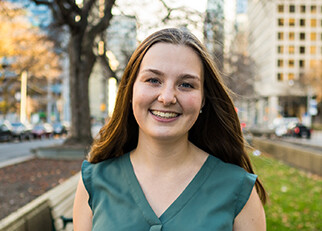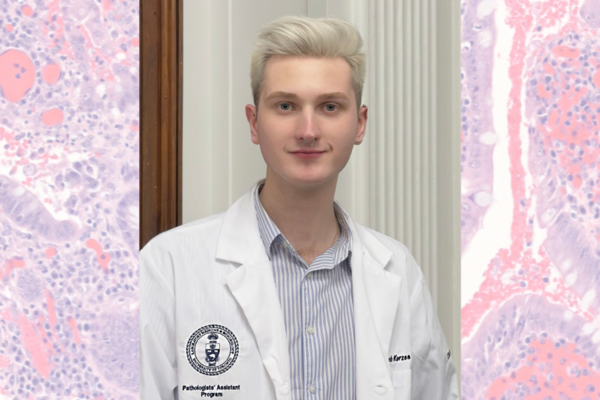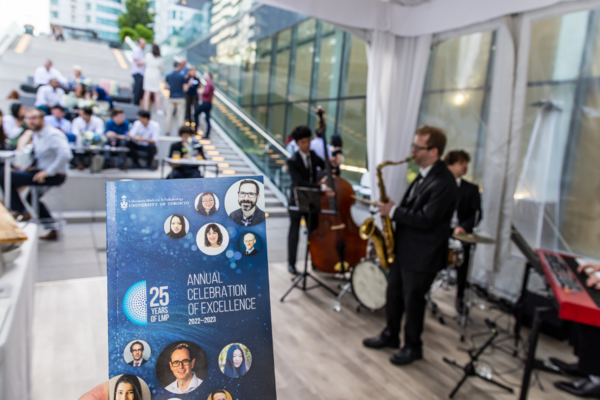Pathologists’ Assistants: playing a key role in patient care

Pathologists' Assistants (PA) are highly trained healthcare professionals who play a vital role in pathology laboratories and patient care.
They are part of a growing profession that is supported by formalized training and a professional career path, which have recently brought more standardization to the industry.
As the first cohort of students make their way through our new professional master's program in the Department of Laboratory Medicine & Pathobiology at the University of Toronto, we spoke to Amy Calovini about what a Pathologists’ Assistant is and how she came to be one at Mount Sinai Hospital, part of Sinai Health.
A beginning in biology
“I always loved dissection classes in high school. I was curious about anatomy, pathology and disease development,” says Amy.
Her love of how living things worked led her to complete an undergraduate degree in biology at McMaster University. During her time there, she enjoyed the hands-on elements of laboratory work and pathology and thought she wanted to become a pathologist or a physician.
A hands-on approach to pathology
“I knew I wanted to focus on the hands-on dissection work in pathology, so the role of a Pathologists’ Assistant was perfect for me” says Amy.
“During my undergraduate degree, I worked in an anatomy lab and other settings to get some dissection experience. I also got some experience completing a biology research thesis. I knew I didn’t want to focus only on clinical or research work, or spend too much time at the microscope, since it was the practical, physical aspects of pathology that really interested me. I wanted more of a balance. When I discovered the PA profession it was a real lightbulb moment.”
At the time, there were only two accredited programs in Canada, and Amy was accepted into the program at Western University.
"As part of the program, I had a rotation at Mount Sinai Hospital. As soon as I met the team there and experienced their laboratory environment, I knew that was where I wanted to be. I managed to secure a role there not long after I finished my studies.”
From grossing specimens, to the autopsy suite
Being part of an interdisciplinary and inter-departmental team with plenty of variety is part of the appeal for Amy.
“My day varies between autopsy and grossing. I like having that rotation and variety in my work, but how much variety you get depends on the laboratory you work in.”
A gross examination consists of creating a report based on all the gross, or macroscopic, findings. It involves descriptions of all the things that you can see, feel and smell (hopefully you don’t have to smell too much!).
The laboratory at Mount Sinai Hospital receives a huge variety in grossing specimens – they can range from small tissue biopsies removed at the time of colonoscopy, all the way up to large multiorgan cancer resections.
“My job as a PA is being the eyes of the pathologist in terms of conducting this gross examination and making the report. Often, the pathologist doesn't actually see the specimen prior to receiving microscope slides, so it's critical that I am descriptive and thorough in my gross examination.
I dictate my findings, photograph, measure, and describe all aspects of our surgical specimens. I then dissect and selectively sample different areas within the specimen which will be examined by the pathologist microscopically.
PAs must have strong attention to detail in order to perform thorough gross examinations. This critical skill is developed over time while training under direct supervision of experienced PAs.
Performing a gross examination independently is a huge responsibility and this was quite daunting when I first started working at the hospital. It was a big learning curve to take on the responsibility and not be reliant on supervisors and peers, like I was during my studies. However, my training background supports me, and I grew in confidence pretty quickly.”
Alongside grossing specimens, Amy is involved in autopsies, tumour banking and teaching.
Making critical decisions for patient care
“One of the most rewarding aspects of my job is that I am directly affecting patient care” says Amy.
“The mystery associated with the field of pathology and the personal satisfaction that comes from working towards diagnoses for patients is what appealed to me most about this profession.
The way I sample a specimen is a critical decision on behalf of the patient and I love the way I can be working in a laboratory but play such a vital role for our patients.”
Teaching is also part of the role which can be very rewarding.
“It’s great to spend time teaching trainees how to gross a new specimen or show them all my secret tips and tricks on how to perform various autopsy techniques. I love then seeing them use those tips and tell their peers about it. It’s very rewarding to see them progress throughout grossing and autopsy rotations.”
How to become a Pathologists’ Assistant
Amy points out that this is a great profession, but it’s not for everyone, so you need to do your research before committing to a two-year master’s program.
“Get as much exposure as possible to what it means to be a PA: job shadow or volunteer in a pathology lab or autopsy suite if you can, and try and get some hands-on dissection experience” advises Amy.
“Try to speak to PAs. Our network is pretty small and well connected so everyone knows everyone. It's important to get those connections established and ask questions - we're always happy to share information with prospective students.”
Now that U of T has started a professional master's program for Pathologists’ Assistants, Amy is excited about the opportunities it will bring.
“I think it is absolutely amazing to start a PA program in Toronto. It's great that more schools are developing PA programs as there is a huge need for them and it provides additional opportunities for students.
I'm also excited about the clinical rotation schedule that U of T has. There are so many specialty centers in Toronto providing opportunities for making connections and seeing a huge variety of surgical specimens and autopsy cases. I can't even imagine seeing the things these students are going to see, it's going to be outstanding. When they go back out to their communities, or to different centers, they will have all the skills and confidence they need to be an effective PA.”
Students in our program will be rotating through Mount Sinai Hospital and so will meet Amy and benefit from her teaching.
“I know that students are going to rotate through our gross lab, so I'm excited to meet them, teach them and share my advice and stories!”



